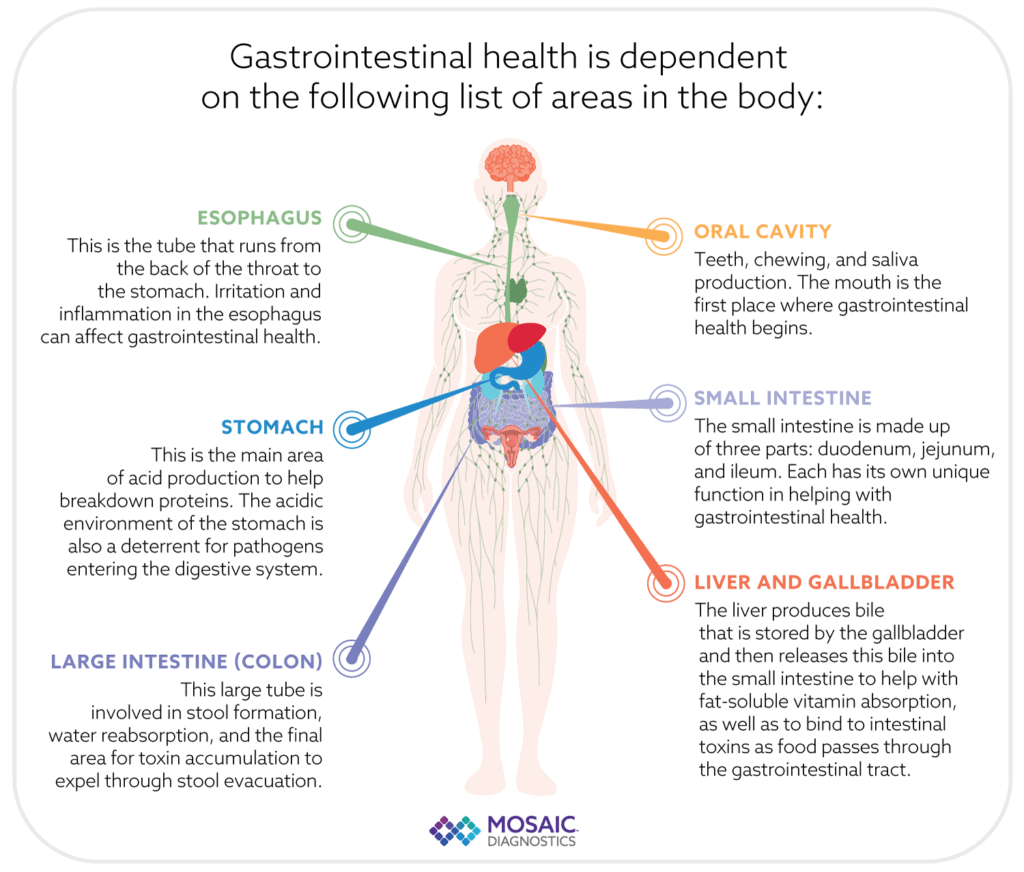Gastrointestinal health is connected to all systems in the digestive tract working in unison providing for proper digestion, assimilation, nutrient absorption, and toxin elimination. Unfortunately, this is a rare occurrence for millions of people in the United States and around the world. In fact, it would be difficult to find someone who hasn’t experienced some type of gastrointestinal complaint at some time in their life. Gastrointestinal health is dependent on the following list of areas in the body:

- Oral cavity – teeth, chewing, and saliva production. The mouth is the first place where gastrointestinal health begins.
- Esophagus – this is the tube that runs from the back of the throat to the stomach. Irritation and inflammation in the esophagus can affect gastrointestinal health.
- Stomach – this is the main area of acid production to help breakdown proteins. The acidic environment of the stomach is also a deterrent for pathogens entering the digestive system.
- Small intestine – the small intestine is made up of three parts: duodenum, jejunum, and ileum. Each has its own unique function in helping with gastrointestinal health.
- Large intestine (aka colon) – this large tube is involved in stool formation, water reabsorption, and the final area for toxin accumulation to expel through stool evacuation.
- Liver and gallbladder – many people don’t realize that the liver and gallbladder play an integral role in gastrointestinal health. The liver produces bile that is stored by the gallbladder and then releases this bile into the small intestine to help with fat-soluble vitamin absorption, as well as to bind to intestinal toxins as food passes through the gastrointestinal tract.
Common Gastrointestinal Symptoms
Many signs and symptoms indicate something is going on in the digestive system that isn’t right. Listed here is a short-list of common complaints:
- Heartburn – also known as acid reflux.
- Acid indigestion – this can manifest as throat discomfort or pain, or stomach discomfort as well.
- Abdominal cramping – this can manifest throughout the entire digestive system.
- Constipation – a common occurrence for anyone with the inability to have normal bowel movements – usually defined as less than 3 bowel movements per week.
- Diarrhea or loose stool – usually associated with an infection, inflammation, or adverse food reaction.
- Foul smelling gas – this causes discomfort in the digestive system such as bloating and cramping and is commonly associated with food reactions and/or bacterial or yeast overgrowth.
- Pain in rectum – this can be associated with hemorrhoids, as well as inflammation.
Gastrointestinal Health Testing Options
For an overall gastrointestinal health assessment, a GI360 Profile, or Comprehensive Stool Analysis (CSA) are excellent profiles to perform. They provide digestive markers for inflammation, fecal blood, bacteria, yeast, and parasites. The GI360 Profile or CSA, along with an Organic Acids Test (OAT), provides in-depth insight into bacteria and yeast toxins, as well as other metabolic problems affecting health.
Many food sensitivities can lead to a lot of gastrointestinal health problems as well, and the comprehensive IgG Food MAP helps to identify various food sensitivities.
The OAT, CSA, and IgG Food MAP tests are three profiles commonly done in practice. These tests are combined to give a broad view of digestive health and factors that can lead to digestive problems.





